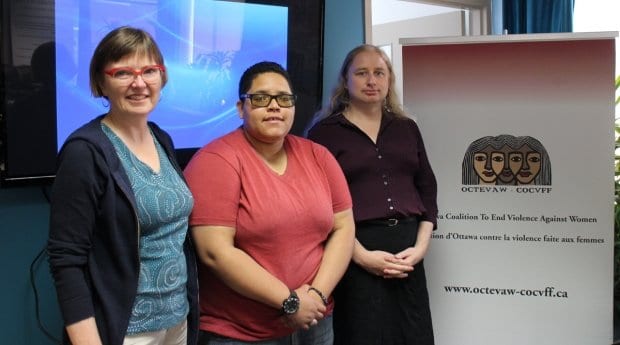Talia Johnson, a local trans activist and educator, says that trans people still face barriers to health care and emergency services.
“If you don’t fit what your healthcare providers or service providers deem to be the acceptable trans woman, you don’t get health care,” she says. “You don’t get access to hormones. I have one friend who didn’t fit the mould because they were autistic and were told, ‘Oh, you can’t possibly know your gender identity because you’re autistic.’”
Johnson, who’s completing her master’s degree in counselling and spirituality, spoke about the intersection of trans identities, intimate partner violence and accessing services at Beyond the Wheel: A Community Conversation on LGBTQ+ Violence, held on June 24, 2015 at the AIDS Committee of Ottawa (ACO).
Johnson talked about her own experiences as a woman who is trans, while also speaking as a counsellor and activist. When her living situation had become unsafe, Johnson says it didn’t even occur to her to go to a shelter.
“We’ve had a constant struggle accessing things like shelter services . . . because of the fear-mongering of trans women that we’re all predators,” she says. “VAW [violence against women] shelters have been very reluctant to provide good services.”
A friend who worked at a shelter told Johnson that her coworkers referred to a trans woman resident as “it.” Declaring a shelter a “safe space” where trans women are welcome doesn’t mean much without staff training and accountability, Johnson says.
Calling police for help or accessing health care services is also difficult for trans people, she says.
“There is a distrust of police, mental health professionals and shelters,” Johnson says. “Even now, if I was in a crisis situation I would not be comfortable going to the Royal Ottawa [Mental Health Centre].”
Education is needed, along with a willingness to reach out to trans communities while recognizing the diversity of those communities, she says. Too often, the people you’d reach out to in times of crisis — police, shelter workers, health care professionals — lack understanding of trans people, she says.
“We’re not there to be educators all the time,” Johnson says. “If I’m in crisis, I’m not going to want to be educating you. That’s not what my role is in that moment.”
Beyond the Wheel was hosted by the Ottawa Coalition to End Violence Against Women (OCTEVAW), Family Services Ottawa, the ACO, Youth Services Bureau and the Ottawa Rape Crisis Centre.
While much of the panel discussion focused on present-day circumstances, Deborah Conners talked about the Barrier Elimination Project (BEP), which studied the accessibility of support services for women experiencing violence in same-sex relationships. BEP’s coordinator Carroll Holland, who passed away in 2012, talked to Daily Xtra in 2004 about the project.
“When we looked at it with current eyes we thought that that survey could provide first a useful baseline data,” Conners says. “But it would need to be updated.”
Kayla Miller, the executive director of PTS — a queer organization that is rebranding as Kind — talked about the challenge of providing a safe space for all LGBT community members. People have become more comfortable stating their safety needs and talking about a way to get those needs met, Miller says.
For example, if your abusive ex-partner accesses services at Kind, it doesn’t feel safe for you to be around that person, but you still might want them to get the support they need, she says. In the past two years, the organization has moved to a restorative justice model. That way, no one misses out on the services they need — but they also don’t have to interact with people who are unsafe for them, Miller says.
“We’re also, over the next year to a year and a half, going to be redoing all of our policies and procedures for the organization so there’s going to be lots of opportunity for people to engage with us and let us know how they think we can best do things to structurally support people,” she says.
Joel Xavier, ACO’s acting men’s health coordinator, talked about violence in the context of living with HIV/AIDS. HIV criminalization creates a power imbalance in a relationship if one person has HIV and the other doesn’t, he says.
“[Violence] typically happens when there’s inequalities of power,” Xavier says. “We already know that from the violence against women movement, but it’s also something that happens within gay male communities in terms of HIV, but also in terms of immigration status, disability and age.”
During informal conversations with queer men at Gay Zone, men often hesitate to use the word “abuse” but will talk about the violence, fear and coercion they’re experiencing in their relationships, he says.
“Sometimes the HIV-negative person can use the poz person’s status to threaten to put him in prison and so that person can’t leave the relationship,” Xavier says. “If my partner works for the federal government in Ottawa and he’s the one who’s paying for my meds . . . or he’s my sponsor . . . what happens if he starts beating me up?”
Fearful of HIV criminalization, many HIV positive people won’t call police if they’re assaulted, he says.
Panellist Luke Smith talked about the Ottawa Men’s Refuge. Aimed at helping male victims of domestic violence, it began as a subcommittee of the Ottawa Police Service GLBT liaison committee and the plan is for it to become a registered charity by the end of the summer, Smith says.


 Why you can trust Xtra
Why you can trust Xtra


